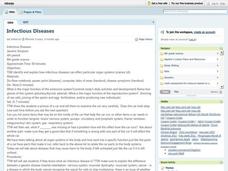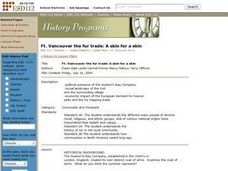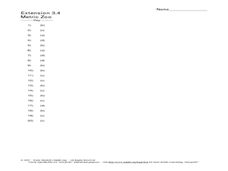Southwest Educational Development Laboratory
The Human Body
Nothing is more relevant than the study of the human body. A series of 10 human body lessons begins with growth, ends with reproduction, and hits all the major systems in between. Each lesson provides opening and closing activities as...
Curated OER
Exercise and the Human Heart
Interpret data and learn about the human heart in one activity! After learning about the way blood flows in the body, fifth graders answer two questions about a graph displaying pulse rate. They then take their own pulses to find the...
Curated OER
Anatomy and Physiology
Fifth graders work in teams to play a game enabling them to identify the basic components of the female human reproductive system. They view an overhead that describes menstruation and discuss their knowledge of the female reproductive...
Curated OER
Infectious Diseases
Eighth graders identify and explain how infectious diseases effect organ systems. Using an analogy with automobiles and body systems, they discover how one part influences the operation of the whole. Students write paragraphs about...
Curated OER
The Human Body
Students research information about the human body. They read books and explore the Internet to gather information about the human body. Students create graphic representations and models of the body systems. Working in groups, they...
Curated OER
Protection, Support, and Locomotion
In this vertebrate skeleton worksheet, students will read a paragraph about the function of bones, muscles, and skin. Then students will complete 6 short answer questions.
Curated OER
My Five Senses
Young scholars investigate the five senses. In this senses lesson plan, students explore the nervous system. Young scholars examine how the body receives information through the five senses.
Curated OER
The Human Body
In this human body activity, students will review the characteristics of the body systems: skeletal, circulatory, muscular, digestive, urinary, endocrine, reproductive, lymphatic, and respiratory systems. This activity has 12 fill in the...
Curated OER
Preventing and Treating Disease
In this disease worksheet, students will review the organs associated with the immune system including their specific functions. This worksheet has 10 matching, 8 true or false, and 5 short answer questions.
Curated OER
Noncommunicable Diseases
For this noncommunicable diseases worksheet, students determine which diseases are not caused by pathogens and where a tumor is located. Then they describe a chronic disease that has a faulty immune system. Students also identify what...
Curated OER
Defense Against Infectious Diseases
In this infectious disease defense worksheet, students will review the immune system including acquired, antibody, and cellular immunity. Students will then compare passive and active immunity to infectious diseases. This worksheet has...
Curated OER
Fish Anatomy
Add a handy reference sheet about fish anatomy and functioning to your learners' biology or animal notebooks. Though this resource doesn't provide any practice, it makes a useful addition to any study of anatomy, biology, species, fish,...
Curated OER
Integumentary System
In this integumentary system worksheet, 9th graders list the two major layers of the skin and name the type of tissue composing each layer. Then they describe the structure and function of the hypodermis. Students also list three types...
Curated OER
Ft. Vancouver the Fur Trade: A Skin for a Skin
Students study Fort Vancouver. They discuss trading and what is meant by "a skin for a skin." They complete math story problems that represent possible trading scenarios. They explore the Chinook Jargon trade language.
Curated OER
Micro-organism Immune System Tag
Students play a game of tag and reinforce their understanding of the immune system.
Curated OER
Using Metric Measurement at the Zoo
In this using metric measurement at the zoo instructional activity, student solve twenty multiple choice problems about the weight and length of zoo animals using the metric system.
American Museum of Natural History
Gusty: The Gut Microbiome Card Game
Build up your gut. Groups up to four play a card game to learn more about the microbiome in the gut. Learners try to build a healthy gut with their cards. The player acquiring six microbes without any pathogens wins the game.
Curated OER
Were the babies switched? – The Genetics of Blood Types
Human biology or genetics learners apply their knowledge to a unique situation: two newborn baby girls being possibly switched in the hospital. The engaging activity ends with a Punnett squares assignment in which pupils evaluate whether...
Curated OER
The Magic School Bus Inside Ralphie
Students learn along with Ms. Frizzle's class. In this Magic School Bus lesson plan, students discover that skin protects our bodies the way apple skin protects an apple.
Curated OER
TECH: Geneticist
A brief PowerPoint is used to introduce the class to the field of genetics by explaining the fields of work, the education required, and the job prospects. A trait inventory worksheet is completed by individuals, and then they gather...
Curated OER
The Muscle System
In this biology worksheet, 9th graders define striated and identify if the muscles of chicken's leg are striated or smooth. Then they determine how the muscles of a chicken leg are attached to the bones. Students also cut muscles away...
Curated OER
UV Rays, sunscreen effectiveness
Middle schoolers identify and define that invisible UV rays can be harmful. Then they explore the effects of UV radiation on objects that react UV rays and what products are most effective in blocking UV rays. Students also make...
Curated OER
Investigating the Method by Which the Body Defends Against Pathogens
Students explore disease caused by bacteria and viruses, how they are transmitted, and how they exert their effects on their hosts. They explain how diseases, such as AIDS, are spread by exponential growth.
Curated OER
Body Organization and Structure
In this human body organization and structure worksheet, students complete 21 fill in the blank questions in the format of word scrambles, riddles, and puzzles.

























